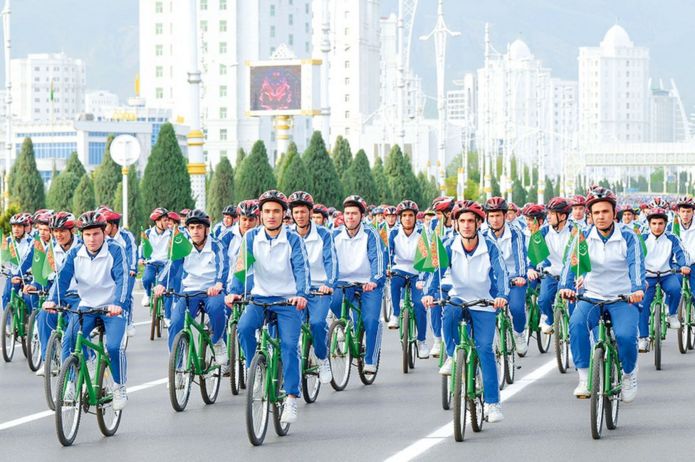Turkmenistan - Bucking The Trend?

My blog continues to experience a spike in visitors from Turkmenistan which is one of the few countries around the world to report 'zero' cases of Coronavirus.
Neighbouring countries including Kazakhstan, Uzbekistan, and Afghanistan have all registered COVID-19 cases which can be viewed on the Johns Hopkins University site.
Iran, to the south, has reported reported a high total of 109,286 confirmed cases and 6,685 deaths.
https://coronavirus.jhu.edu/map.html
https://coronavirus.jhu.edu/map.html
Turkmenistan (09/03/20)

The blog site has had lots of visits from Turkmenistan in recent days, a country I know little about although it has a similar population to Scotland (5.6 million) spread over a much larger land mass.
Turkmenistan is bordered by the Caspian Sea, Kazakstan, Uzbekistan, Afghanistan and Iran and its capital Ashqabat is on the old Silk Road to China.

Now I write about lots of things on my blog not just equal pay, but I wonder what attracts all these visits from Turkmenistan which used to be part of the old Soviet Union.

Turkmenistan is highlighted in red
Turkmenistan - Bound To End Badly (09/04/20)

Here's an interesting report from the BBC on the central Asian country of Turkmenistan which claims to have no (zero) cases of Coronavirus
I had a surge of visitors to the blog from Turkmenistan a few weeks ago and the thing that jumps out from the photo below is that as well as having no Covid-19 cases - Turkmenistan seems to be suffering from a severe shortage of women cyclists.
https://www.bbc.co.uk/news/world-asia-52186521
Coronavirus: Why has Turkmenistan reported no cases?
By Abdujalil Abdurasulov - BBC


Image copyright - MIGRATION.GOV.TM Image caption - The mass cycle rally is billed as a highlight of the day of health on 7 April
As the Covid-19 map gets covered by growing red circles, several countries still haven't registered a single case of infection, including one of the most repressive states in the world - Turkmenistan. Many experts are concerned its government may be hiding the truth, which could disrupt attempts to end the pandemic.
While the world battles coronavirus and more and more countries lock down their populations, Turkmenistan is holding a mass cycling rally to mark World Health Day on Tuesday.
The Central Asian country claims it still has zero coronavirus cases. But can we trust the figures provided by a government renowned for censorship?
"Official health statistics from Turkmenistan are notoriously unreliable," said Professor Martin McKee from the London School of Hygiene and Tropical Medicine, who has studied the Turkmen healthcare system.
"For the past decade they have claimed to have no people living with HIV/Aids, a figure that is not plausible. We also know that, in the 2000s, they suppressed evidence of a series of outbreaks, including plague."
Many in Turkmenistan are even afraid of suggesting Covid-19 may already be in the country.
"My acquaintance who works in a state agency told me that I shouldn't say that the virus is here or that I heard about it, otherwise I may get into trouble," said a resident of the capital Ashgabat, who asked to remain anonymous.
As the Covid-19 map gets covered by growing red circles, several countries still haven't registered a single case of infection, including one of the most repressive states in the world - Turkmenistan. Many experts are concerned its government may be hiding the truth, which could disrupt attempts to end the pandemic.
While the world battles coronavirus and more and more countries lock down their populations, Turkmenistan is holding a mass cycling rally to mark World Health Day on Tuesday.
The Central Asian country claims it still has zero coronavirus cases. But can we trust the figures provided by a government renowned for censorship?
"Official health statistics from Turkmenistan are notoriously unreliable," said Professor Martin McKee from the London School of Hygiene and Tropical Medicine, who has studied the Turkmen healthcare system.
"For the past decade they have claimed to have no people living with HIV/Aids, a figure that is not plausible. We also know that, in the 2000s, they suppressed evidence of a series of outbreaks, including plague."
Many in Turkmenistan are even afraid of suggesting Covid-19 may already be in the country.
"My acquaintance who works in a state agency told me that I shouldn't say that the virus is here or that I heard about it, otherwise I may get into trouble," said a resident of the capital Ashgabat, who asked to remain anonymous.

Image caption - In February, Turkmen hospitals did have posters about coronavirus but they were removed
The Turkmen authorities are, however, working on tackling a possible outbreak.
Together with UN agencies in the country, they are discussing a plan of action.
The UN Resident Co-ordinator, Elena Panova, told the BBC that this plan included country level co-ordination, risk communication, case investigation, laboratory diagnostics and other measures.
When I asked her whether the UN trusted the official figures showing Turkmenistan had no confirmed Covid-19 cases, Ms Panova avoided giving a straight answer.
"We are relying on official information because this is what all countries are doing," she said. "There is no question of trust because that's the way it works."
Ms Panova said early measures on restricting travel might have contributed to lack of confirmed cases.
The Turkmen authorities are, however, working on tackling a possible outbreak.
Together with UN agencies in the country, they are discussing a plan of action.
The UN Resident Co-ordinator, Elena Panova, told the BBC that this plan included country level co-ordination, risk communication, case investigation, laboratory diagnostics and other measures.
When I asked her whether the UN trusted the official figures showing Turkmenistan had no confirmed Covid-19 cases, Ms Panova avoided giving a straight answer.
"We are relying on official information because this is what all countries are doing," she said. "There is no question of trust because that's the way it works."
Ms Panova said early measures on restricting travel might have contributed to lack of confirmed cases.
- Berdymukhamedov ridiculed for exercise video
- Turkmen president drifts into pole position at rally
- How the rumour mill 'killed off' a president
- All you need to know about Turkmenistan
It also cancelled flights to China and some other countries in early February and started diverting all international flights from the capital to Turkmenabat in the north-east, where a quarantine zone was created.
However, according to several residents, some people were able bribe their way out of the zone and avoid two weeks of isolation in a tent.
Ms Panova said everyone arriving in the country and those showing symptoms were being tested for Covid-19. However, she could not give exact figures of how many tests were conducted a day and how many test kits Turkmenistan had overall.
"What we understand in talking to government officials is that they have sufficient tests."
But how ready is the health system to deal with a coronavirus outbreak?
"We don't know," Ms Panova admitted. "We've been told that they have a certain level of preparedness and we don't doubt it... as the hospitals here are very well equipped."
"However, if there is an outbreak that's a huge pressure on the health system like in any other country. So, irrespective of how much you've prepared, it usually is insufficient. That's why we're already talking to them about procuring ventilators, and also other types of equipment."
There is some sense of awareness of the outbreak among the public. Movement between cities has been restricted and those who enter Ashgabat must now have a doctor's note.

Image copyright - TURKMEN STATE TV Image caption - President Berdymukhamedov is frequently seen cycling or in other sporty pursuits
Markets and offices are being fumigated with smoke from a type of grass called yuzarlik, used in herbal remedies, after President Gurbanguly Berdymukhamedov said burning it would ward off the virus - despite there being no evidence.
But unlike most of the world, daily life in Turkmenistan continues as normal.
Cafes and restaurants are open. Crowds gather for weddings. Nobody wears masks and mass events are going ahead.
It appears the country is in denial about admitting the major threat posed by coronavirus.
Markets and offices are being fumigated with smoke from a type of grass called yuzarlik, used in herbal remedies, after President Gurbanguly Berdymukhamedov said burning it would ward off the virus - despite there being no evidence.
But unlike most of the world, daily life in Turkmenistan continues as normal.
Cafes and restaurants are open. Crowds gather for weddings. Nobody wears masks and mass events are going ahead.
It appears the country is in denial about admitting the major threat posed by coronavirus.
Why might that be?
The World Health Day mass cycle may provide an explanation.
President Berdymukhamedov is the biggest star and the main focus of the annual event.
The image of health is part of his cult of personality. State TV regularly shows him lifting weights in the gym, or cycling on his bike. He is the main driver of "health and happiness" campaigns in which state employees wearing identical uniforms do their morning exercises.
The main message of all these events is that the nation is healthy, and thus happy, thanks to the president.
Mr Berdymukhamedov proclaimed his presidency as the "era of might and happiness". And an outbreak of Covid-19 could expose how hollow his messages are.

Media caption - Four ways to protect yourself from coronavirus
It is for this reason the Turkmen government might try to conceal an outbreak, even if its citizens do get infected.
And that is what worries Prof McKee.
"We have seen how the Covid-19 infection moved rapidly from China to all parts of the world. In this globalised economy that we now live in, every country is only as secure as the weakest country in the world," he said.
"Even if other countries manage to get the epidemic under control, there is a risk of continued seeding of infections from those countries that have failed to. It seems that Turkmenistan may well be another example."
President Berdymukhamedov is the biggest star and the main focus of the annual event.
The image of health is part of his cult of personality. State TV regularly shows him lifting weights in the gym, or cycling on his bike. He is the main driver of "health and happiness" campaigns in which state employees wearing identical uniforms do their morning exercises.
The main message of all these events is that the nation is healthy, and thus happy, thanks to the president.
Mr Berdymukhamedov proclaimed his presidency as the "era of might and happiness". And an outbreak of Covid-19 could expose how hollow his messages are.

Media caption - Four ways to protect yourself from coronavirus
It is for this reason the Turkmen government might try to conceal an outbreak, even if its citizens do get infected.
And that is what worries Prof McKee.
"We have seen how the Covid-19 infection moved rapidly from China to all parts of the world. In this globalised economy that we now live in, every country is only as secure as the weakest country in the world," he said.
"Even if other countries manage to get the epidemic under control, there is a risk of continued seeding of infections from those countries that have failed to. It seems that Turkmenistan may well be another example."

